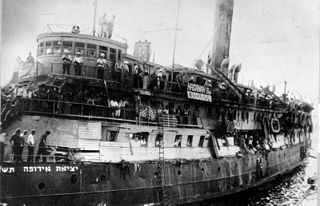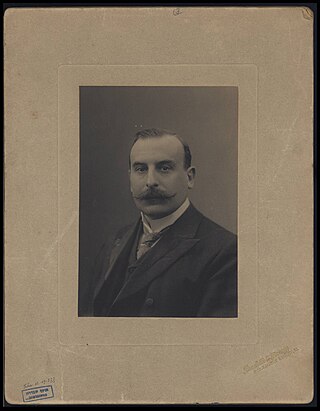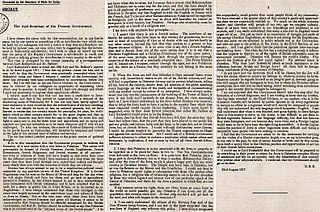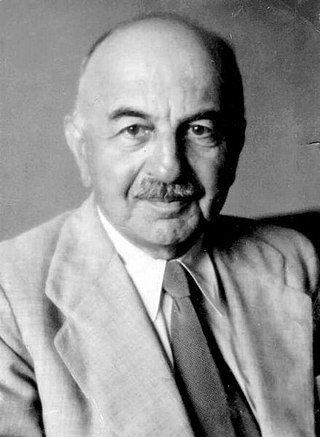Related Research Articles

The Balfour Declaration was a public statement issued by the British Government in 1917 during the First World War announcing its support for the establishment of a "national home for the Jewish people" in Palestine, then an Ottoman region with a small minority Jewish population. The declaration was contained in a letter dated 2 November 1917 from the United Kingdom's Foreign Secretary Arthur Balfour to Lord Rothschild, a leader of the British Jewish community, for transmission to the Zionist Federation of Great Britain and Ireland. The text of the declaration was published in the press on 9 November 1917.

Zionism is a nationalist movement that emerged in the 19th century to enable the establishment of a homeland for the Jewish people in Palestine, a region roughly corresponding to the Land of Israel in Jewish tradition. Following the establishment of the modern state of Israel, Zionism became an ideology that supports "the development and protection of the State of Israel".

Chaim Azriel Weizmann was a Russian-born biochemist, Zionist leader and Israeli statesman who served as president of the Zionist Organization and later as the first president of Israel. He was elected on 16 February 1949, and served until his death in 1952. Weizmann was instrumental in obtaining the Balfour Declaration and later convincing the United States government to recognize the newly formed State of Israel.
This is a partial timeline of Zionism in the modern era, since the start of the 16th century.

A homeland for the Jewish people is an idea rooted in Jewish history, religion, and culture. The Jewish aspiration to return to Zion, generally associated with divine redemption, has suffused Jewish religious thought since the destruction of the First Temple and the Babylonian exile.

Asher Zvi Hirsch Ginsberg, primarily known by his Hebrew name and pen name Ahad Ha'am, was a Hebrew journalist and essayist, and one of the foremost pre-state Zionist thinkers. He is known as the founder of cultural Zionism. With his vision of a Jewish "spiritual center" in Eretz Israel, his views regarding the purpose of a Jewish state contrasted with those of prominent figures within the Zionist movement such as Theodor Herzl, the founder of political Zionism. Unlike Herzl, Ahad Ha'am strived for "a Jewish state and not merely a state of Jews".

Yishuv, or HaYishuv HaIvri, or HaYishuv HaYehudi Be'Eretz Yisra'el, denote the body of Jewish residents in Palestine prior to the establishment of the State of Israel in 1948. The term came into use in the 1880s, when there were about 25,000 Jews living in that region, and continued to be used until 1948, by which time there were some 630,000 Jews there. The term is still in use to denote the pre-1948 Jewish residents in Palestine, corresponding to the southern part of Ottoman Syria until 1918, OETA South in 1917–1920, and Mandatory Palestine in 1920–1948.

Herbert Louis Samuel, 1st Viscount Samuel, was a British Liberal politician who was the party leader from 1931 to 1935.
The Biltmore Conference, also known by its resolution as the Biltmore Program, was a fundamental departure from traditional Zionist policy by its demand "that Palestine be established as a Jewish Commonwealth." The meeting was held in New York City, at the prestigious Biltmore Hotel, from May 9 to May 11, 1942, with 600 delegates and Zionist leaders from 18 countries attending.

Samuel Montagu, 1st Baron Swaythling, was a British banker who founded the bank of Samuel Montagu & Co. He was a philanthropist and Liberal politician who sat in the House of Commons from 1885 to 1900, and was later raised to the peerage. Montagu was a pious Orthodox Jew, and devoted himself to social services and advancing Jewish institutions.

Lucien Wolf was an English Jewish journalist, diplomat, historian, and advocate of rights for Jews and other minorities. While Wolf was devoted to minority rights, he opposed Jewish nationalism as expressed in Zionism, which he regarded an incentive to anti-Semitism. In 1917 he co-founded the anti-Zionist League of British Jews.

David Lindo Alexander was an English barrister and Jewish community leader.
As an organized nationalist movement, Zionism is generally considered to have been founded by Theodor Herzl in 1897. However, the history of Zionism began earlier and is intertwined with Jewish history and Judaism. The organizations of Hovevei Zion, held as the forerunners of modern Zionist ideals, were responsible for the creation of 20 Jewish towns in Palestine between 1870 and 1897.
In world politics, Jewish state is a characterization of Israel as the nation-state and sovereign homeland of the Jewish people.

Louis Samuel Montagu, 2nd Baron Swaythling was a prominent member of the British Jewish community, a financier, and a political activist. He was the son and heir of Samuel Montagu, 1st Baron Swaythling, and of his wife Ellen (Cohen).

L. J. Greenberg, born Leopold Jacob Greenberg (1861–1931), was a British journalist. He had become an energetic propagandist of the new Zionism in England by the Third Zionist Congress in 1899, at which he and Jacob de Haas were elected as members of the ZO's Propaganda Committee. His frequent dialectical debates were conducted as editor of The Jewish Chronicle, the leading paper in Britain for the Jewish community. Greenberg called for decency and humanity towards World Jewry.

Anti-Zionism is opposition to Zionism. Although anti-Zionism is a heterogeneous phenomenon, all its proponents agree that the creation of the modern State of Israel, and the movement to create a sovereign Jewish state in the region of Palestine—the biblical Land of Israel—was flawed or unjust in some way.
The American Council for Judaism (ACJ) is an organization of American Jews committed to the proposition that Jews are not a national but a religious group, adhering to the original stated principles of Reform Judaism, as articulated in the 1885 Pittsburgh Platform. In particular, it is notable for its historical opposition to Zionism. Although it has since moderated its stance on the issue, it still advocates that American Jews distance themselves from Israel politically, and does not view Israel as a universal Jewish homeland. The ACJ has also championed women's rights, including the right for women to serve as rabbis, and has supported Reform Jewish congregations and contributed to the publication of new editions of prayer books for religious services predominately in the English language for Jews in English-speaking countries.
This timeline of anti-Zionism chronicles the history of anti-Zionism, including events in the history of anti-Zionist thought.

Arthur Menachem Hantke was a jurist, lawyer and economist, one of the leaders of Zionist movement in Germany and one of the leaders of the Zionist fundraising organization Keren Hayesod.
References
- 1 2 "To Combat Zionism". The Modern View. 28 December 1917. p. 13. Retrieved 17 April 2020– via Newspapers.com.
- 1 2 Kolsky, Thomas (1992). Jews Against Zionism: The American Council for Judaism, 1942-1948. Temple University Press. p. 17. ISBN 978-1-56639-009-5.
- 1 2 3 Kadish, Sharman (1988). Frankel, Jonathan; Medding, Peter Y.; Mendelsohn, Ezra (eds.). Studies in Contemporary Jewry: IV: The Jews and the European Crisis, 1914-1921. OUP USA/Institute of Contemporary Jewry, Hebrew University of Jerusalem. pp. 96–109. ISBN 978-0-19-505113-1.